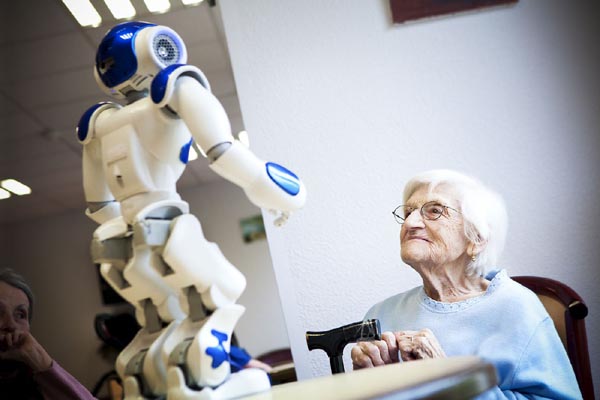Home Health Care
Are Robots the Solution to Caregiver Burnout?

What is caregiver burnout?
The role of a family caregiver can be physically and mentally demanding. These high demands and daily stressful tasks lead most caregivers into “caregiver burnout.”
This is a state of exhaustion that poses health concerns for the caregiver and the older adult being cared for.
Burnout can occur when family caregivers don’t receive needed help, aren’t able to take a break, or are doing more than they are physically or financially able to do.
Symptoms of caregiver burnout include:
- Withdrawal from social life
- Loss of interest in previously enjoyed activities
- Loss of appetite or weight gain
- Lack of quality sleep
- Weakened immune system
- Emotional, mental, and physical exhaustion
- Being stressed, anxious, depressed, or easily irritable
These symptoms impact the caregiver’s health and negatively affect the elderly person.
Burnout has long been a problem for family caregivers because they rarely get the support they need. And although there are caregiver support groups, these resources can only help so much.
What most caregivers really need is caregiving assistance or a short break.
Luckily, there might be a new solution: Elder Care Robots.
What are eldercare robots?
Elder care robots, powered by machine learning and advanced artificial intelligence, assist caregivers with their daily caregiving tasks.
This could include:
- Help with moving the senior in and out of bed
- Bathing and showering
- Meal preparation
- Medication and appointment reminders
- and more
These benefits provide assistance to caregivers without sacrificing the medical care for the seniors.
Although this might sound crazy, the idea isn’t new.
Some hospitals and assisted living facilities are already implementing elder care robots into their facilities.
For instance, the Florida Department of Elder Affairs provided a total of 1,800 robotic pet companions to socially isolated seniors in assisted living facilities last year. The department initially only ordered 375 robots, but after outstanding feedback and increased demand due to COVID, they decided to order more.
So, can robots prevent caregiver burnout? It’s possible.
Can elder care robots prevent caregiver burnout?
Currently, elder care robots are limited on their functionality and how much care they are actually able to perform. Right now, no commercially available elder care robot can take on all of the tasks of a caregiver.
Instead, most robots only focus on one area of care.
For instance, PARO, the therapeutic robot seal, is a great companion for socially isolated seniors. Studies have found that this robot can reduce negative emotions, improve social engagement, promote positive mood, and prevent dementia!
But, this robot only offers social and emotional support. It lacks in providing physical care, such as bathing, dressing, or eating.
Other robots, like Panasonic’s Resyone Plus robotic bed or Cyberdyne’s HAL Lumbar Exoskeleton, help move your loved one but do not provide any emotional support. These robots aren’t autonomous and have no artificial intelligence, meaning you still have to operate them manually.
The limited support provided by the current elder care robots means you still have to do most caregiving tasks. But, these robots can assist you in making your job a little easier.
This help could prevent caregiver burnout by making daily caregiving duties less taxing physically, mentally, and emotionally.
For instance, by using Cyberdyne’s exoskeleton, you can easily move your loved one from their bed to a couch without hurting you or your loved one.
As the industry raises more funding and technology advances, we will likely see more eldercare robots in the future. Eventually, these robots will be able to assist with all of the tasks of a family caregiver.
This possibility leads to a big question: should we leave caregiving to robots?
The ethics of elder care robots
Although it might be easy to leave all of the stressful caregiving tasks to a robot, that doesn’t mean it is the right thing to do. Some philosophers have raised concerns about leaving caregiver duties to robots.
These philosophers say that displacing caregiver tasks to robots makes it easy to ignore the needs, rights, and preferences of the elderly person. Other philosophers, like Amanda and Noel Sharkey, raise concerns about the need for human interaction in their paper, “Granny and the Robots.”
Since the elder care robot industry is still new, there are still many ethical questions to be answered. It’s important to remember that robots are inherently good or bad; it just depends on how we use them.
The benefits of these robots can significantly improve the health of both caregivers and seniors. So instead of completely replacing caregivers and removing all human interaction, it might be better to integrate elder care robots with human caregivers.
In this way, both the caregivers and the seniors will get the support they need.








